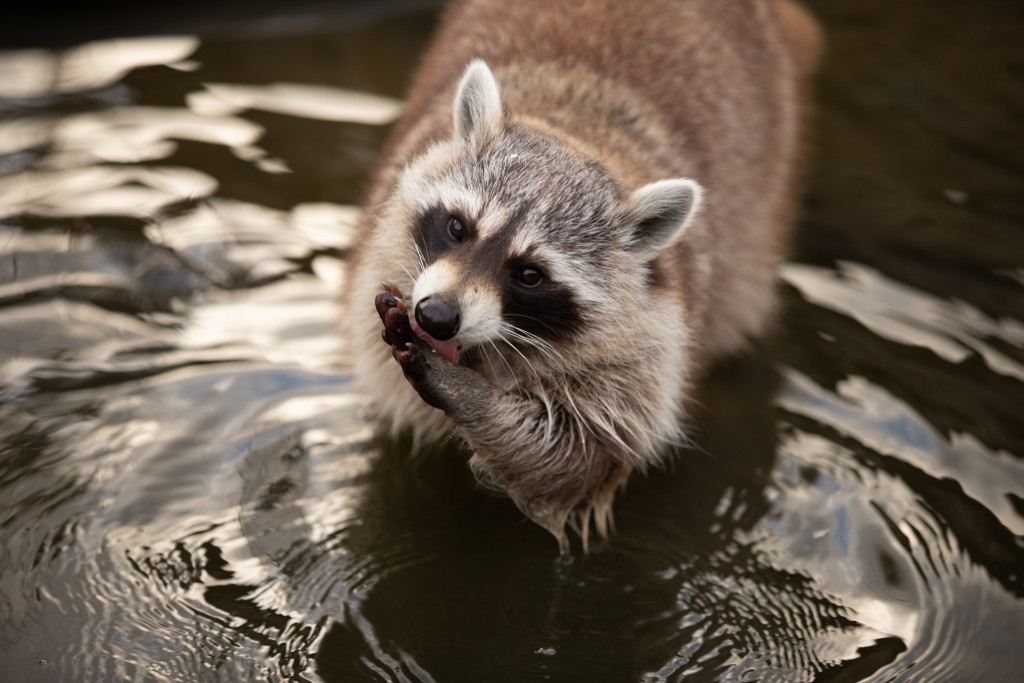• Raccoons can cause significant damage to property by breaking in, tearing insulation and drywall, and chewing wiring.
• They are known to spread diseases like rabies and distemper through parasites like fleas, ticks, mites, lice, and roundworms.
• Raccoons can create noise pollution by being active at night and disrupting people’s sleep.
• They are also known to raid trash cans for food, creating a mess that needs to be cleaned up afterward.
Raccoons are native to the United States and can be found in various habitats, ranging from forests and mountains to urban areas. They typically have gray or black fur with distinctive “raccoon masks” on their faces. Raccoons are omnivores, meaning that they eat both plants and animals. However, this means that they can be considered pests in many cities.
Raccoons in Your Neighborhood
Raccoons are intriguing and resourceful animals, but when they invade your community, they can cause severe damage. It’s essential to know the signs that a raccoon is causing a problem so you can take action quickly. Here are four ways raccoons can negatively impact your community.
Damage to Property
Raccoons are notorious for their ability to break into homes and businesses, often in search of food or shelter. They will tear apart insulation, rip through drywall or siding, and even chew through electrical wiring.
This can result in costly repairs and even more significant problems if the wiring is exposed to other pests or elements. The best way to protect against this property damage is by keeping food sources away from your home or business and sealing up any possible entry points.

Disease Transmission
Raccoons carry parasites like fleas, ticks, mites, lice, and roundworms which can spread disease throughout your community. These diseases can range from mild illnesses such as diarrhea and fever to more severe ailments such as rabies or distemper, which can be fatal if not treated promptly. To reduce the risk of getting sick from contact with a raccoon, it’s essential to avoid contact with them if possible and wash hands thoroughly after contacting them or their droppings.
Noise Pollution
Raccoons are nocturnal animals, meaning they are most active at night when people are trying to sleep. So if you hear loud noises from inside your walls or attic at night, it could be a sign that a raccoon is living there.
It’s essential to address this issue quickly, as noise pollution can disrupt your sleep cycle and negatively impact your health. The best way to do this is by hiring an experienced wildlife removal expert who can safely trap the raccoon and relocate it away from your home or community.
Trash Can Raiding
Raccoons have been known to raid trash cans for food, resulting in a mess that needs to be cleaned up afterward. To prevent having trash scattered around your yard each morning, it’s essential to keep all garbage cans sealed tightly with lid locks so the raccoons cannot get into them. You may also want to consider investing in animal-proof trash cans explicitly designed to keep out pests like raccoons.
Tips to Reduce The Raccoon Population
If your community is notorious for having raccoons in the area, there are some steps you can take to reduce their population. Here are some ways to do that:
Tree Maintenance
Raccoons love to climb trees, so it’s important to trim back branches and prune them away from buildings or other places raccoons may enter. You can ask a local tree trimming service to help with this task. They can ensure that no branches are left hanging that could provide access to an attic or other area.

Secure Garbage Cans
Raccoons are notorious for getting into garbage cans, so make sure all lids are secured tightly and locked with a lid lock to prevent them from accessing the contents. You may also want to invest in animal-proof trash cans explicitly designed for keeping out pests like raccoons.
Remove Food Sources
Raccoons are more likely to invade your community if there is an easy food source. To reduce their numbers, ensure that bird feeders are not left out overnight, as this could be a significant attraction for raccoons. Additionally, pet food should not be left out, and all garbage cans must be securely sealed.
Hire a Professional
If the raccoon population in your community is too large for you to handle on your own, it’s best to hire a professional wildlife removal expert. They can safely trap any raccoons on your property and relocate them to a more suitable location.
By following these tips, you can help to reduce the raccoon population in your community and protect your property from potential damage. Additionally, it’s essential to practice good hygiene and avoid contact with raccoons whenever possible, as they can carry parasites that can cause serious illnesses.

